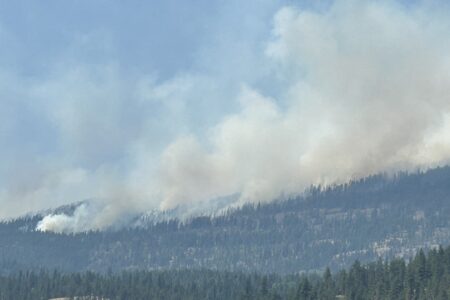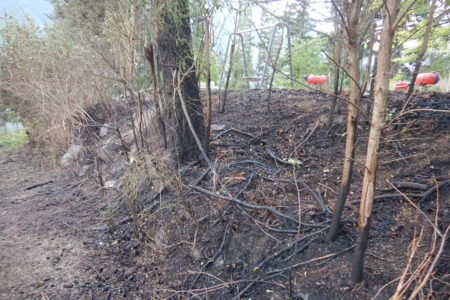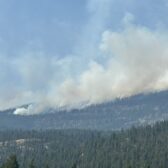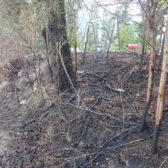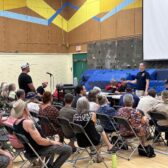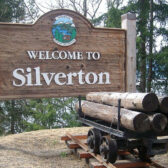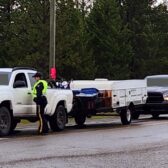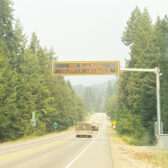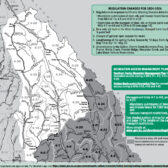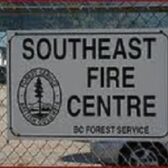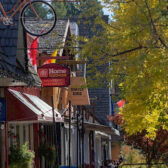Largest existing seasonal street patio approved for Savoy Hotel on a one-year trial basis
The city’s first oversize sidewalk café will be put into play this summer in a municipal experiment to see if such a large public establishment can be manageable.
Around 60 people will be accommodated on the soon-to-be constructed seasonal patio outside of the former Savoy Hotel, now owned by the Shambhala Festival organizers.
At over 40 patrons larger than any of the existing 18 patios currently allowed on Nelson’s downtown streets, the patio is expected to cover four parking stalls, one more than the city bylaw allowed.
On Monday night in city council chambers, the Shambhala developers overcame a city staff concern and won their case to gaining the variance to occupy the extended parcel of pavement on a one-year trial basis.
Coun. Bob Adams proposed and city council passed the variance and a one-year licence of occupation for the building owners.
“But if there are a ton of problems we will say no to (four stalls) and it’s three for next year,” he said.
The new patio would provide a way to gather real-world data on how a bigger patio could function in Nelson’s downtown, said Coun. Anna Purcell.
“This might be a great way to test out how disruptive a bigger patio of this size might be,” she said.
If the experiment fails and the large patio proves too disruptive, it would be scaled back to an area covering three parking stalls, an agreement the building’s owner Jim Bundschuh was in favour of.
“It would be totally reasonable to do that,” he told council.
The proposed patio was deemed consistent with the city’s sustainability principles for prosperity and resiliency, as it contributes to the development of a vibrant and welcoming downtown, and it fosters a diverse and flexible business community, a city staff report read.
Further, it was consistent with the policy direction for the downtown neighbourhood, which was to maintain a healthy retail and cultural area with a mix of uses that keep it lively both day and night.
In 2015, there were 18 sidewalk cafés in Nelson. Eleven of these were associated with establishments serving alcohol. Administration has confirmed that all of these patios complied with the size requirements specified in council policy.
“Staff are generally supportive of the proposed patio and believe that it will contribute to an active and vibrant downtown culture,” city senior planner Megan Squires told council.
“However, we are concerned that the gathering of 60 people on the street as part of an entertainment establishment will generate a significant amount of noise and that this will negatively impact the residential neighbourhood located approximately 65 metres to the south on Victoria Street.”
Enforcement staff may be affected if this variance is approved, as the number of complaints to the Bylaw Department may increase, she noted.
Once completed, the Savoy Hotel will include four distinct businesses: a nightclub; a restaurant and music lounge; another restaurant; and tourist accommodation with 12 rooms and a rooftop amenity area for guests, which will include food and liquor service and a hot tub.
“Given this mix of businesses, it is reasonable to expect that this building is going generate significant noise,” Squires said. “Without proper restrictions in place, it is likely that residents who live in the downtown will experience negative impacts.”
The risk of noise may deter prospective future residents, she added, thus undermining the city’s long-term vision for a mix of residential and commercial uses in the downtown.
For comparison, the cities of Kelowna, Summerland and Rossland have the following size limits on outdoor patios:
- Kelowna: two parallel parking stalls or three angled stalls;
- Summerland: one parking stall per block, per side with a maximum patio size of 2.5 m. x 5.5 m. (total area of 13.75m2); and
- Rossland: a maximum of four tables with four chairs per table on the sidewalk. Patios are not permitted in parking stalls.
The Savoy stalls will be occupied for the duration of the sidewalk café season, which starts May 1 and finishes on Oct. 31.
In response to the concerns raised by the Nelson Police over crowds, safety and noise in a public space, the Savoy developers revised the hours of operation to be 7 a.m. to 10 p.m.
These hours will be written into the license to occupy and they will become part of the contract agreement between the city and the business owner.
Squires said city administration was also concerned that varying the parking stall requirements at this time was premature, given that the city will be reviewing these regulations as part of the Urban Design Strategy.
As part of the Downtown Urban Design Strategy planning process, Development Services staff will be looking at the requirements for sidewalk cafés. New requirements are anticipated to be in place by spring 2017.
“So there is an opportunity for the public to get involved in this in the coming year,” said Squires.
City narrowly misses in Voter Challenge
Close but no cigar for Nelson was the ultimate message Monday night after the organizers of the Kootenay Community Voter Challenge revealed the results of the last federal election vote.
Nelson (11 per cent) came in behind the winning community of Rossland (12.7 per cent) in the challenge amongst 14 Kootenay communities directed at increasing voter turnout in the federal election.
Overall across the region’s two federal ridings, voter turnout increased by two per cent, the highest turnout being in the Village of Slocan, where 84 per cent of voters cast an ‘X.’
“This is just a testament of community engagement … and it’s an example for other communities across the province,” said organizer Mike Chapman.
Through the Kootenay Community Voter’s Challenge, other communities in the region were challenged to see who could most increase voter turn out from the previous election in 2011.
Nelson came in at 64 per cent of eligible voters casting an ‘X,’ two per cent below the provincial average of 66 per cent in the previous federal election.




